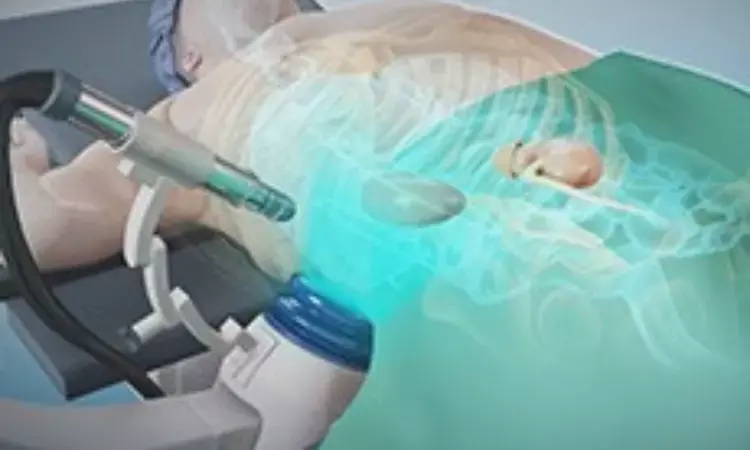- Home
- Medical news & Guidelines
- Anesthesiology
- Cardiology and CTVS
- Critical Care
- Dentistry
- Dermatology
- Diabetes and Endocrinology
- ENT
- Gastroenterology
- Medicine
- Nephrology
- Neurology
- Obstretics-Gynaecology
- Oncology
- Ophthalmology
- Orthopaedics
- Pediatrics-Neonatology
- Psychiatry
- Pulmonology
- Radiology
- Surgery
- Urology
- Laboratory Medicine
- Diet
- Nursing
- Paramedical
- Physiotherapy
- Health news
- Fact Check
- Bone Health Fact Check
- Brain Health Fact Check
- Cancer Related Fact Check
- Child Care Fact Check
- Dental and oral health fact check
- Diabetes and metabolic health fact check
- Diet and Nutrition Fact Check
- Eye and ENT Care Fact Check
- Fitness fact check
- Gut health fact check
- Heart health fact check
- Kidney health fact check
- Medical education fact check
- Men's health fact check
- Respiratory fact check
- Skin and hair care fact check
- Vaccine and Immunization fact check
- Women's health fact check
- AYUSH
- State News
- Andaman and Nicobar Islands
- Andhra Pradesh
- Arunachal Pradesh
- Assam
- Bihar
- Chandigarh
- Chattisgarh
- Dadra and Nagar Haveli
- Daman and Diu
- Delhi
- Goa
- Gujarat
- Haryana
- Himachal Pradesh
- Jammu & Kashmir
- Jharkhand
- Karnataka
- Kerala
- Ladakh
- Lakshadweep
- Madhya Pradesh
- Maharashtra
- Manipur
- Meghalaya
- Mizoram
- Nagaland
- Odisha
- Puducherry
- Punjab
- Rajasthan
- Sikkim
- Tamil Nadu
- Telangana
- Tripura
- Uttar Pradesh
- Uttrakhand
- West Bengal
- Medical Education
- Industry
Prone Position More Effective for Treating Proximal Ureteral Stones with Shock Wave Lithotripsy, finds study

A recent multi-center study revealed that the prone position is significantly more effective than the supine position for treating proximal ureteral stones using ultrasound-guided shock wave lithotripsy (SWL). This study published in the World Journal of Urology was conducted between June 2020 and December 2023 to determine the optimal patient position for maximizing treatment outcomes.
The prospective study involved a total of 1,187 patients with proximal ureteral stones, divided nearly equally between those treated in the prone (50.5%) and supine (49.5%) positions. This research assessed the stone-free rate (SFR) as the primary outcome, while secondary outcomes included the complete SFR, the number of SWL sessions required, and complication rates. A propensity score-matched (PSM) analysis was performed to ensure fair comparisons between the two groups.
The patients treated in the prone position showed a superior SFR of 85.7% when compared to 77.4% in the supine position (P = 0.001). Also, the complete SFR, which measures the total elimination of stones, was higher in the prone group at 83.3%, versus 75.0% in the supine group (P = 0.001). Both groups required a similar number of SWL sessions (prone: 1.27, supine: 1.20; P = 0.092), and the complication rates were statistically insignificant across the groups, demonstrating that the prone position does not compromise safety.
The prone position was associated with a shorter skin-to-stone distance (SSD), an important metric for SWL success. The patients in the prone group had an SSD of 50 mm when compared to 101 mm in the supine group (P < 0.001), likely contributing to the improved SFR in the prone position.
The study concludes that the prone position offers better outcomes for patients with proximal ureteral stones undergoing SWL without increasing complications. The shorter SSD in this position may explain the improved effectiveness. The findings advocate prioritizing the prone position for eligible patients, particularly when treatment feasibility allows.
Overall, the findings of this study provide valuable insights for medical practitioners by enabling them to tailor treatment protocols for better patient outcomes. While both positions remain viable, the evidence strongly supports the prone position as the preferred option for managing proximal ureteral stones through SWL.
Source:
Shan, L., Liu, G., Ge, C., Guo, H., Song, S., Wu, F., & Bai, S. (2024). The effectiveness and safety between prone position and supine position for ultrasound guided shock wave lithotripsy in proximal ureteral stones: a multi-center prospective propensity score-matching study. In World Journal of Urology (Vol. 43, Issue 1). Springer Science and Business Media LLC. https://doi.org/10.1007/s00345-024-05383-6
Neuroscience Masters graduate
Jacinthlyn Sylvia, a Neuroscience Master's graduate from Chennai has worked extensively in deciphering the neurobiology of cognition and motor control in aging. She also has spread-out exposure to Neurosurgery from her Bachelor’s. She is currently involved in active Neuro-Oncology research. She is an upcoming neuroscientist with a fiery passion for writing. Her news cover at Medical Dialogues feature recent discoveries and updates from the healthcare and biomedical research fields. She can be reached at editorial@medicaldialogues.in
Dr Kamal Kant Kohli-MBBS, DTCD- a chest specialist with more than 30 years of practice and a flair for writing clinical articles, Dr Kamal Kant Kohli joined Medical Dialogues as a Chief Editor of Medical News. Besides writing articles, as an editor, he proofreads and verifies all the medical content published on Medical Dialogues including those coming from journals, studies,medical conferences,guidelines etc. Email: drkohli@medicaldialogues.in. Contact no. 011-43720751


